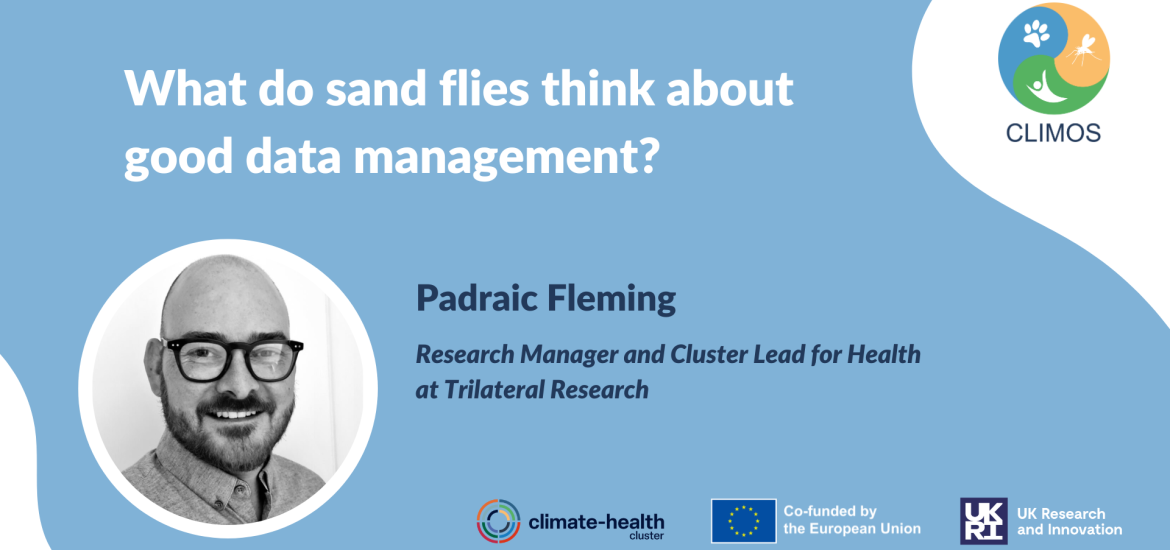There’s a good chance that sand flies don’t give much thought to research ethics or data management. However, the researchers in CLIMOS certainly do.
CLIMOS is an EU-funded project that aims to develop an early warning system that alerts veterinary and public health professionals and the public about the climate-driven migration of sand flies and associated sand fly-borne diseases throughout Europe. Given the wide geographical spread of sand flies, this project is relatively large, with 29 partner organisations, working together across 16 countries, within and outside of the EU. This diversity complicates essential values underlying responsible research and innovation, for example, reproducibility and transparency of the research, quality and accuracy, accountability, long-term preservation, as well as practical considerations such as ability to publish in high-impact journals. As a result, standardised approaches to ethics and data management are paramount to ensure the integrity of the research findings.
Trilateral Research, the CLIMOS partner responsible for ethics and data management in the project, has been involved in dozens of European-funded projects over the past 20 years. Based on this experience, Trilateral’s researchers can attest to the fact that organisations and project partners have collectively been on a journey of continuous improvement towards systematically applying gold standard practices to ethics and data management. An important recent catalyst for the increased awareness of the importance of data protection was the introduction of the General Data Protection Regulations (GDPR) which came into effect in 2018.
Beyond the obvious need for compliance in advance of the GDPR legislation becoming effective in 2018, Trilateral Research saw the opportunities that the GDPR presented in terms of better and more conscientious data use and management, the promotion of FAIR principles (making data Findable, Accessible, Interoperable and Reuseable), and increased transparency and accessibility through Open Data and other advancements. Those who work regularly with data now have a deeper understanding of the processes and protocols that enable FAIR and Open data use, while ensuring the protection of both data providers and processors. In the CLIMOS project, data management practices that previously might have been overlooked are now proactively considered, debated, and incorporated into project work.
The Trilateral team was also aware of the unintended implications of the GDPR: the likelihood, at least in the short term, that some organisations and researchers would over-interpret the regulations,
and in turn unnecessarily impede the very FAIR principles that the GDPR intended to promote. This over-interpretation ultimately came from a place of fear of doing the wrong thing and exposing your organisation to substantial penalties should the fail to comply with the regulation. Now that the dust has settled on the GDPR, it is fair to say that this challenge still exists in some circumstances. The Trilateral team sees it as its continued mission to promote both good data protection practices as well as socially valuable research, so that one does not impede the other.
For CLIMOS, although most of the project’s research data did not contain personal data, meaning the GDPR did not apply, partners took a conscientious, considered, and organised approach to data management.
Take, for example, the use of exact geographic coordinates related to collection sites for sand flies, which are a critical data point captured in the datasets that feed into the CLIMOS Early Warning System models under development.
At first glance, coordinates may not seem like personal data, especially when collection sites are located in parkland or other seemingly non-identifiable areas. However, after carefully considering the issue, partners agreed that some coordinates could point to individual private farms, which could constitute personal data if combined with other information. Taking the time to think through each data point being collected allowed researchers to better understand implications beyond the primary intention of the project. This process resulted in a more complete and transparent informational leaflet to accompany the ‘informed consent’ form that was given to landowners who allowed sand fly traps to be placed on their property. It also led to agreed-upon processes and procedures for anonymising the coordinate data points when preparing the data for sharing beyond the project partners (i.e., through open data platforms).
A vast number of health and climate research projects are currently being conducted simultaneously across Europe and beyond. Despite the availability of extensive literature and gold-standard guidelines, the practical implementation of data management practices continues to vary across disciplines and professional groups, contributing to a lack of standardisation and other issues. For this reason, CLIMOS is part of the European Commission Climate-Health cluster, where six different projects, with 116 partner organisations across 30 countries, come together to share knowledge and advance the understanding of what constitutes “good data management” in health and climate research. Although the health and climate fields continue to face challenges, the EU stands out as a global leader—driven by innovative and policy-aware research efforts like CLIMOS that are setting benchmarks for responsible data practices.
